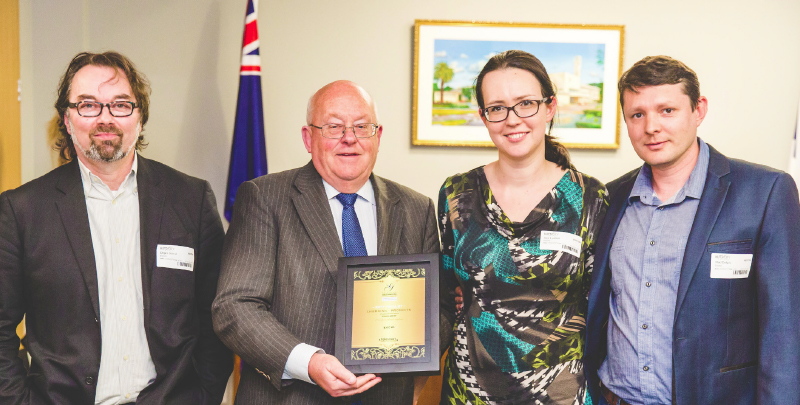CHAMPION OF RESPONSIBILITY
Samantha Jones has a social conscience stretching all the way to India.
Samantha Jones has a social conscience stretching all the way to India. Her uniform business is a leader in social responsibility and ethical procurement. There is much to admire about Little Yellow Bird.
For a young girl growing up, having a father working as a diplomat for the government came with unique benefits – not least of which, the chance to see the world from an early age.
Four years spent in Russia before returning to Wellington, then finishing high school in Indonesia, opened Samantha Jones eyes to the real world and deeply influenced the start of her business journey some years later.
But owning a business wasn’t her original dream. An online advert for New Zealand Air Force university scholarships had caught her eye. She was encouraged to study commerce, which led to a logistics officer’s supply chain role – helping secure aircraft parts to keep the Orions and Seasprite helicopters operational and assisting on international exercises.
With the prospect of job advancement some five years away Samantha found boredom creeping in – it was time to pursue her business dream.
The idea for Little Yellow Bird, her Wellington-based company that produces ethically-made, fair-trade uniforms for corporates, businesses and events, was sparked when, having previously had a uniform supplied through the Air Force, Samantha now struggled to purchase corporate workwear that met her requirements for a part-time job. Even her sister, a lawyer, was having difficulty finding suitable work clothing.
Samantha had also remembered a disturbing sight as a school-girl in Jakarta. Looking over the river that flowed past her school she could see textile factories discharging waste – into the same river people used for drinking water. That, combined with her international security studies some years later, eventually led her to “join the dots”.
“It finally dawned on me that all the products we consume are causing these [environmental] problems. I didn’t want to be part of that; I wanted to create a business that actively tried to change things.”
Samantha was keen to launch her “social impact” venture. Little Yellow Bird first took flight in March 2015, and today the 28-year-old is sole director and has two employees in Wellington, as well as a quality control/production manager in India – where she sources her organic cotton (‘rain-fed’) garments, and can trace each garment right back to its cotton farm.
Her Indian employee, whom she met in a cotton-field, also helps out with Little Yellow Bird’s community impact projects. Samantha says it’s vital to have someone on the ground who understands the needs of the local community.
“For example, after funding some girls through school their parents became concerned that they were now too educated to get married.
“It’s unintentional impacts such as this that you have to be aware of. I’ve learnt it’s better to involve the community and find out what the people want.”
For Samantha, the most satisfying aspect of Little Yellow Bird is that there is no negative impact – nobody is harmed during the process of getting garments from field or factory to
end consumers.
Plastic packaging is down 90 percent on 2017; paper use is minimal and paper recycled; Little Yellow Bird is a Sustainable Business Network (SBN) member; and a certified B Corp.
“We’re proud to be the only uniform company in the world certified B Corp,” says Samantha. “It means that while we aim
to make a profit, we don’t do it at the expense of people or
the planet.”
Growth pains
Samantha admits to having some growing pains along her business journey. It took a while to find a team that gelled. There have been the usual cashflow and supply chain hiccups, and issues in communicating with India. However, winning around $50k through various business support programs over the years has made all the difference to their survival – it even helped fund airfares to India.
Vital sales have also resulted from various awards Samantha has entered. She was a SheEO finalist and, at the Innovation Awards, a finalist in the Innovation in Sustainability & Renewable Energy category and the overall Young New Zealand Innovator of the Year.
She has also been a finalist in the Wellington Gold Awards,
New Zealand Women of Influence Awards, SBN Awards, and is part of the Edmund Hillary Fellowship – helping connect ‘high impact’ entrepreneurs and investors overseas with businesses in New Zealand.
Little Yellow Bird has customers worldwide. Their largest client, based in the US, actually found them through a Japanese publication. And here in New Zealand they pretty much have the ethically-sourced organic uniform space to themselves.
The journey has had its high points – such as moving into their own office last year – as well as low points. Samantha remembers the day they completely ran out of money – only to receive a call that afternoon to say they’d won a $100k tender.
Suddenly their worst day had turned into one of their best!
Lessons and goals
Develop resilience quickly – that’s a key business lesson from Samantha. “It never gets easier – you just get more skilled at dealing with things.
“Recognise that things will go wrong and learn to focus on the bigger picture,” she advises. “If you’re not repeating your mistakes then you’re improving.”
“My big message is that profit doesn’t need to come at the expense of ethics. They go hand in hand. The most profitable businesses in the future will be ethically-minded – that’s what the young generation is demanding.”
Samantha’s advice for start-ups includes securing the best in legal and accounting services. “Getting that stuff right is super important.”
She’s also pleased she didn’t bow to pressure to take on investment early in the business’s journey. “Because we did make mistakes, and if we’d made those mistakes at scale then we would have wasted people’s money.”
Samantha’s goal is for Little Yellow Bird to become a nationally recognised brand that supplies New Zealand’s biggest companies and challenges people to think sustainably and ethically.
The timing is perfect; she recently raised awareness on ethical fashion even further by helping organise the eco-fashion conference at Wellington’s City Gallery on April 19. Peri Drysdale and Jessie Wong were included in a powerful nine-speaker line-up and Samantha also took to the stage.
It was yet another opportunity to spread the message on ethics, and from personal experience.



